#basque elections
Text
The leftwing separatist coalition EH Bildu, widely viewed as the political heir of the defunct armed group ETA, made a major breakthrough in Sunday's Basque regional elections although falling short of the win predicted by pollsters.
With 99 percent of the vote counted, Bildu increased its representation from 21 to 27 mandates in the 75-seat Basque parliament, giving it the same result as the centrist Basque Nationalist Party (PNV), which has ruled the region for decades.
Polls had predicted a tight race, seeing a narrow victory for Bildu -- a coalition which has worked to disassociate itself from ETA, whose bloody struggle for an independent Basque homeland claimed 850 lives before it rejected violence in 2011.
And six years after ETA's dissolution, EH Bildu has pursued a winning strategy, putting its pro-independence demands on the back burner and focusing strongly on social issues, securing a solid following among young people under 40.
continue reading
#spain#basque country#regional elections#eh bildu#increased vote share#basque independence#not on the cards
27 notes
·
View notes
Text
How the votes for Basque presidency have changed in Euskadi. [x]
#euskal herria#basque country#pays basque#pais vasco#euskadi#culture#politics#video#maps#elections#interesting
15 notes
·
View notes
Text
HOLY FUCKING SHIT THE RIGHT AND ALT RIGHT LOST THE ELECTIONS IN SPAIN LET'S FUCKIN GOOOOOO
#For those of you who may not know much about spain politics#The alt right was threatening entering the presidental with 2 parties PP (Neo- liberals) And Vox (Alt Right)#but the President for PP fucking sucks and screwed up massively even after they won in the elections of 28 may#since he's actually a compulsive liar and corrupt (was friends with a drug dealer) and due to his disappointing last week of campain#he can't win#PP 136 & VOX 31 VS PSOE 122 (Social Democrats) & Sumar 31 (Left Wing) + a bunch of left wing regional parties#This is also a huge issue in Europe as far right governments have kept winning but not here baby!!!#Thankfully the Social democrat even if a bit cringe did a good campaign (They actually won 2 more seats despite being in power for 5 years)#Sumar thankfully didn't lost much (around 4-5 seats) even if during the 28 may elections the left almost disappear#(Sumar is a coalition of 15 left wings parties including what was the previous big left. party)#And the regionals force related with independence in catalonia and basque even if they lost a bit of power#(PSOE AND PP FUCKIN rolled this elections and we kinda have a bit of bipartisan problem)#but holy shit I'm so happy#To win you need 176 seats the right at max gets 170-171 versus left 172-179#Those weird 7 seats with the left is “junts” a left wing independent catalonian party which will prob side with us for obvious reasons#Spain#España#elections#elecciones#política#politics
9 notes
·
View notes
Text
Holy shit.
0 notes
Text
Left may pull ahead in Basque elections
The far-left Basque party EH Bildu, has a good chance of coming out on top in the regional elections on 21 April, Spanish media reported.
Founded in 2012, EH Bildu is a coalition of pro-independence and nationalist Basque parties with six representatives in the Spanish parliament, led by former ETA member Arnaldo Otegi.
Following the return of democracy to Spain (1975-1976) and the creation of the so-called “state of autonomies”, a quasi-federal model developed between 1979 and 1995, these Basque elections are set to be the closest in recent history, EFE news agency reported. Young people in particular find EH Bildu’s proposals interesting, especially regarding unemployment, the difficulties of emancipation and access to a first home.
EH Bildu “reinforces itself as a useful party capable of rejecting maximalism and extreme positions, and this is rewarded in the ballot” at a time when “social issues are more important than the (pro-independence) debate,” Braulio Gomez, professor of political science at Deusto University and director of the Deustobarómetro poll, told Spanish public television RTVE last week.
Read more HERE
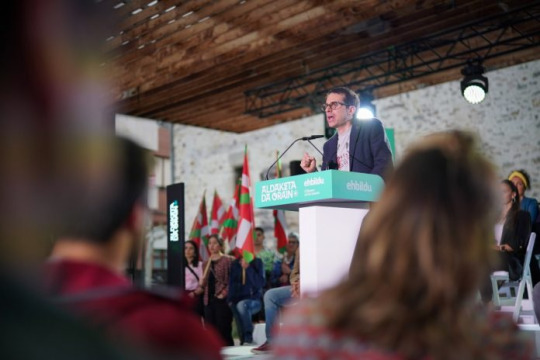
#world news#world politics#news#europe#european news#european union#eu politics#eu news#spain#basque country#elections#election 2024#election
0 notes
Note
Hi. A question in relation to your response a few asks ago. As a leftist foreigner, I have always thought Catalonia and its independence movement have a cemented leftist core, but is that just me simply being an essentialist and simplifying the dynamics since the war? Of course, I understand that most Catalans, like most people, are just normal people living their lives and wanting health and happiness and not hard-core extremists either way. I'm half Palestinian and boy, am I tired of people painting us as inherently political when all we want to do is, you know, stay alive. But, I've always just imagined Catalonia as a stronghold for socialist and anarchist vibes. Is that off? And if it's not off, how come one Spanish narrative is that Catalans are bourgeois and capitalist has been so prominent? Like, what are they basing that on? The fact that Catalonia is a somewhat wealthy region? And how do leftists respond to that? Sorry for sensitive questions I'm just really intrigued by this. Sending all the love from one occupied people to another.
First of all, my most sincere best wishes for liberation and solidarity to you and all the Palestinian people 🇵🇸❤️
You are right, Catalonia is a stronghold of leftism. It can be seen easily in maps of election results every time there are Spanish elections, or polls, etc. Catalonia and Euskadi always stand out. This is so prominent that there's even a Twitter account called The F*ck*ing Same Map Again making fun of this, lol. And within the independence movement even more so, too. Historically, the Catalan independence movement has been very linked to communism, with presence of social democrats as well. Since around 2010, many more social democrats and liberals have joined, too. This is not to say that no other profile exists, as you pointed out you can't expect a whole country to have the same ideology, but it's overwhelmingly the case.
The reason why the Spanish left likes to stereotype Catalans as bourgeois (at the same time as, when it's more convenient to them, they also stereotype Catalan people and language as a poor rural farmers' language) comes from the fact that Catalonia (and to a lesser extent also the Basque Country) were the only places of the state of Spain that were industrialized during the Industrial Revolution and for most of the 20th century. This created a very prominent Catalan working class —for your ask, I assume you know about the CNT, the collectivizations, etc. To give an overview, in 1919 about ⅕ of ALL of Catalonia's population was affiliated to the CNT anarchist union, that is not counting people in the rural areas affiliated to unions for rural workers like Unió de Rabassaires that also sympatized with CNT in many matters but was more focused on agricultural workers. More than ⅕ of the whole country's population being a paying member of the anarchist union!— But, of course, industrialization also produced a muuuuuuuch smaller amount of bourgeoisie. While most Southern and Central Spain was still ruled by the aristocracy that owned most of the land and hired agricultural workers on a daily basis (jornaleros), in Catalonia there were bourgeois factory owners.
In the 1920s, many people came from rural areas of Spain to Barcelona and other urban areas of Catalonia (the population of Catalonia tripled with their arrival), and in the 1960s again the same (this migration tripled again Catalonia's population). In many places, the people who were arriving lived side by side with the people who were already there, usually learned Catalan and mixed with the population. But in some places around Barcelona, because there wasn't enough housing in the city for all the huge amount of people who were arriving, the regime (this was still under Franco's dictatorship) built "dormitory suburbs" where previously there was no town nor suburb. Areas that used to be fields suddenly were all built into cheap housing for the arriving Spanish workers, often with very bad conditions when it comes to public services. Thus, there were pockets of the newly-arrived population that lived in areas only created for them and only inhabited by people who had arrived at the same time as them. The result is that these workers only ever knew other Spanish immigrants, and the only Catalan people they ever met would be at their jobs when they commuted out of their dormitory suburbs into Barcelona's centre. This way, in these pockets of the population (which, of course, did not come free of Catalanophobia) the idea that everyday people spoke Spanish and the bosses and managers spoke Catalan was cemented.
(Obviously, I don't mean to say that everyone in those neighborhoods thought this, only that it was an idea that developed and spread to many people there. There were also people who did not see all the Catalan people as enemies and kept a good class analysis and allied with the Catalan working class and the Catalan people as an oppressed group. A famous example is the writer Paco Candel who lived in one of these new working class neighbourhoods and was an activist for the working class and also for Catalan language, cultural and political rights. I don't think it's been translated to English, but if anyone reading this wants to get a very good view of what the situation was like, the must-read is Paco Candel's 1964 book Els altres catalans).
The idea that "people like us" speak Spanish and bosses speak Catalan is, of course, objectively false. Since in every place capitalism needs more workers than bosses, the first proletariat of the state of Spain was Catalan, and the overwhelming majority of Catalans were and are working class. And the poorest areas of Catalonia are also the ones where Catalan is most spoken and Spanish is rarely heard (all of them in Terres de l'Ebre, a largely agricultural area). At the same time, Spanish has always remained the language of power, the only one spoken by the police, the army, the government, the public administration, etc and the one that rich people want to be heard speaking for prestige reasons. Even more so back then, when Catalan was prohibited and legally persecuted in many sectors. But despite being an overall false picture, it was the experience of these people day after day. The mix of already-present Catalanophobia with the "confirmation" of Catalan people being their enemies in the workplace created this very weird and very out-of-touch mentality of Catalan people being bourgeois in a small part of the Spanish speaking people, while for the vast majority the idea of still that speaking Catalan is for extremist antifascists and that it was a thread for the fascist state and for the very existence of Spain and thus needed to be erradicated. With time, after the dictatorship ended and the democracy period started (1978), the Spanish left was legalized (Catalan independentist parties would take a while yet, because it was said that "Catalan separatists are more dangerous than the communists", but in some time ended up legalized as well, except for some Basque parties that have been illegal until the 21st century) and a part of the Spanish left instrumentalized Catalanophobia to gain votes in some circles, so they used this rhetoric and it spread more, because it gave them a justification that used the right words to sound vaguely leftist and they don't have to question their beliefs nor prejudices.
I hope this answers your question. Thank you very much for your interest and your solidarity, it's greatly appreciated.
60 notes
·
View notes
Text

Born on 3 October 1967, Javier de Andrés is a Spanish politician. A member of the People's Party, he served as Deputy General of Álava from 2011 to 2015 and as Delegate of the Government in the Basque Country from 2016 to 2018. He was elected to the 15th Congress of Deputies in the 2023 Spanish general election representing Álava.

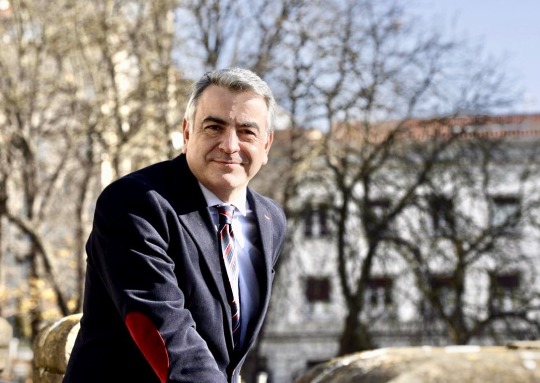

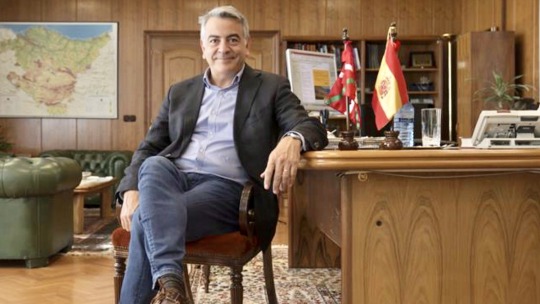

67 notes
·
View notes
Photo
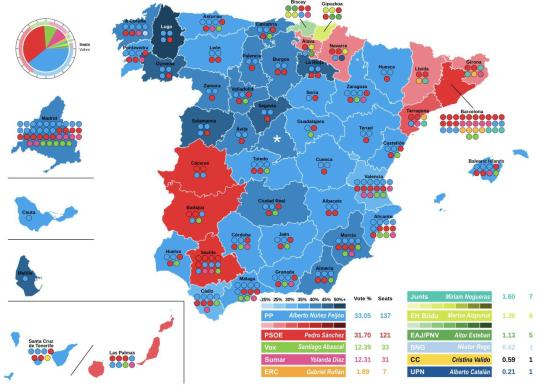
2023 Spanish General election results. Right wing opposition blocfalls short of expected majority, Sánchez might be reelected.
via u/SkylineReddit252K19S
Parties:
• PP: right/center-right (opposition leader).
• PSOE: center-left (govt)
• Vox: far-right
• Sumar: left/far-left coalition (govt partners)
• Bildu, ERC, BNG: Left wing moderate (ish) separatists.
• PNV, CC: center-right Basque/Canary nationalist. Do not want independence.
• Junts: right wing Catalan separatists. Tried to declare Catalan independence in 2017.
• UPN: Similar to PP but with a Navarrese regionalist (anti Basque nationalist) twist.
Majority: 176 seats
PP+Vox+UPN+CC: 172.
Everyone else except Junts (aka the parties that made Sánchez president in 2020): 171.
Junts (7 seats) said they will support whoever gives them an independence referendum. But that's impossible. So the possibilities are:
• Junts reaches a more reasonable compromise with Sánchez (more likely than with Feijóo) and risks being seen as traitors by hardcore separatists.
• The elections are repeated around Christmas.
55 notes
·
View notes
Note
📢❗ QUIZ TIME! 📢❗
⚠️❌ Do not google the answer so it's more fun!
Question: On December 20th 1973, the Basque national liberation movement Euskadi Ta Askatasuna killed the newly-elected Spanish Prime Minister Carrero Blanco while he was on his way to mass. What was the codename of their operation?
1) Operación Sexo
2) Operación Txikia
3) Operación Ogro
4) Operación Euskadi
I'm 80% it was Operación Ogro, the first Spanish manned space program
10 notes
·
View notes
Text
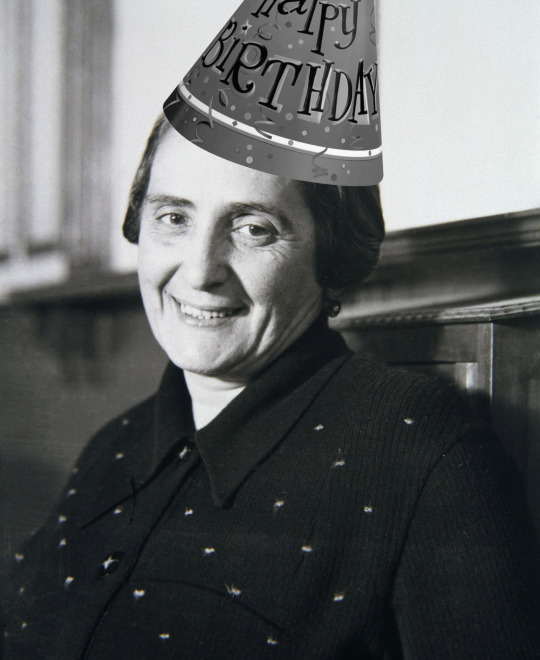
Happy birthday, Dolores Ibarruri! (December 9, 1895)
Known as "la Pasionaria" (the Passionflower), Dolores Ibarruri was born to a Basque father in Biscay. Working in traditionally feminine trades as a teenager, she became involved in the trade unions, participating in the general strike of 1917. She read the works of Karl Marx and other socialist theorists, and became a communist herself. She joined the Spanish Communist Party (later the Communist Party of Spain) upon its founding in 1920 and quickly became a major party leader in the Basque Country. When the Spanish Second Republic was established in 1931, Ibarurri moved to Madrid to continue her work as a party functionary and was arrested for her activities several times. In 1936, Ibarruri was elected to the Spanish Parliament as part of the left-wing Popular Front's electoral victory. During the Spanish Civil War, Ibarruri proved an incisive and strident ideologue, rallying Spanish Republicans to the cause of defeating the fascist insurgency. She gave several speeches broadcast over radio, and is credited for coining the phrase ¡No Pasarán! ("They Shall Not Pass"). After the collapse of the Republic, Ibarruri fled Spain, coming to the Soviet Union and working for the Communist International. From 1942 to 1960, Ibarruri held the title of General Secretary of the Communist Party of Spain, and after she stepped down she was named the party's honorary president. Ibarruri returned to Spain in 1977 after the end of fascist rule, and was reelected to the Parliament, occupying the same seat she had held before her exile. She retired from the Parliament in 1979, and spent the rest of her life as an activist, dying in 1989.
126 notes
·
View notes
Note
Not sure if you even care, but since you are posting about elections I would like to inform that EH Bildu (the pro-independence leftist Basque party in Spain) got the most votes in Basque Country/Euskadi and also got many in Navarra.
Interesting! Thx for the heads up [28 May 23]
#not super familiar w current basque politics so no positions on bildu#iirc didnt ETA say theyd made massive mistakes or smth a few years ago?#then dissolved#seems like a positive that the idea of independence didnt end w them
13 notes
·
View notes
Text
Okay 2 questions,
wtf are you still doing in Araba voting for Vox???
wtf do we Biscayans have in our heads to keep voting massively for PNV???
11 notes
·
View notes
Note
hiii can you explain the drama behind the video real madrid shared ?
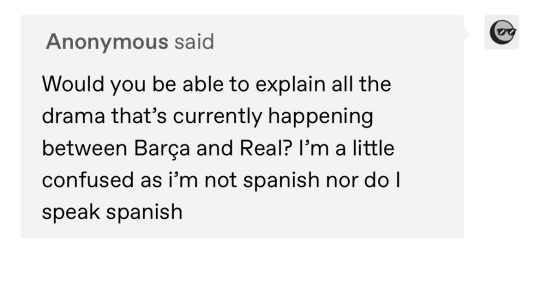
I had to wait until today to have the time and a clearer head to answer this, sorry .
Fc Barcelona elected president Joan Laporta had a press conference on Monday were he explained, within what's legally sound for him to do, everything that's going on with the Negreira Case. Talking about the role of Negreira's company and what they did for him and an overview of how those 7 million over the 18 years. It all seems pretty bland, and I'm confident the trial will go nowhere. When he was finishing up his statement he criticized Real Madrid for trying to join the case against Fc Barcelona as a party that had been affected by the alleged actions FcB had taken to get refs in their favor (which we all know didn't happen, we lost at least one league because of bad ref calls that helped Real Madrid win La Liga) . Laporta said that it was a move that was hastily decision from their part and also highly cynical because Real Madrid had been highly favored during the years, explaining they were the regime's team (Franco and the Royals' team) that for 70 years all the high ranking officials in the league, the referee committees and the majority of referees were members, ex player, ex director or related to Real Madrid and for them to act like the golden era of Fc Barcelona affected them was a act of high cynicism. Btw the current president of both la liga and Spanish Football Federation are both huge Real Madrid fans and they admit lol .
Real Madrid waited until like 12AM the next day to publish a video basically accusing Fc Barcelona of being the regime's (Franco's dictatorship government) team with footage of the Camp Nou's inaguration with Franco and his official's there, saying that FcB gave him honors and such, like anything else would have been acceptable under a dictatorship. What's most offensive about the whole allegation is that all cultural minorities in Spain like the Basque, Catalans, Gallegos and such were prohibited from expressing their cultural identity or language. For the Basque it was so oppressive (Basque predates the Castilian community and language btw) and offensive that there were guerilla and terrorist groups (ETA) formed to fight the Spanish government up until the 1990s, even when Franco and the dictatorship was done. For the Catalans and Catalonia, it was pretty oppressive as well. During the Civil War that led to Franco's dictatorship, Barcelona was one of the last strongholds for fighting against the fascists, especially because the City of Barcelona had been turned into a anarco-socialist society, were women were treated as equal, totally democratic work places and organizations, etc. So, Franco carpet bombed the city. Not only that, the offices of Fc Barcelona were bombed but the president of Fc Barcelona at the time of the war was ordered to be killed. All things Catalan were made illegal, you couldn't register any new children with a Catalan name, you couldn't teach Catalan at school, you were arrested for speaking Catalan in public. Futbol Club Barcelona became Club de Futbol Barcelona to make it Spanish and not Catalan etc. So the allegation that Franco's regime favored Fc Barcelona, one of the pillars of the Catalan identity in Catalonia, is super offensive and just a lie, it is a an offense to the historical memory of a country and to the many people who were killed and put in mass graves or arrested for just being catalan or fighting for their right to express their cultural identity. The first Jordi in years who was registered in the 70s was Jordi Cruyff, bc Johan Cruyff (SUPER IMPORTANT Fc Barcelona player, later coach who taught Pep everything, we love Cruyff) named him that in the Netherlands and traveled back with him, they freaked out when they saw his name. Jordi Cruyff one of current sporting directors under Laporta. SO IMAGINE! How terribly offensive and stupid that Real Madrid was. It's like something out of Fox News or The Daily Mail, style fake news and totally offensive. BTW some Real Madrid fan still use the fascist flag of Spain, it was seen last year in the stands. Those people have some fucking gall. Shit club, shit history. That's why you always will see "libertad" and "Independencia" signs and Catalan identity and independence signs and chants at Fcb. Visca Barca y Visca Catalunya.
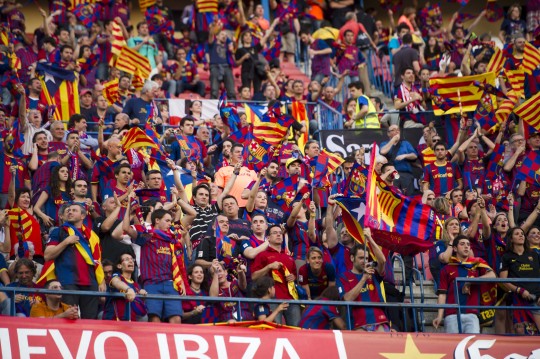
10 notes
·
View notes
Text
Spain appears destined for painful political negotiations after Sunday’s elections, when no single party won enough parliamentary seats to form a government. Prospects for coalition-building now remain uncertain.
With over 99% of the vote counted, the center-right Partido Popular (PP) is set to come in first, winning 136 seats. The upstart far-right Vox party, a possible coalition partner to PP, is forecast to win 33 seats.
Prime Minister Pedro Sanchez’s ruling center-left Socialist party meanwhile is on course to win 122 seats, with likely coalition partners Sumar at 31 seats.
In order to govern, a party or coalition must achieve a working majority of 176 seats in the 350-seat legislature.
PP leader Alberto Nunez Feijoo said he was “very proud” during a speech at party headquarters, lauding the fact that his party’s vote share increased from 21% to 33%.
Despite a party-like atmosphere at the PP headquarters, supporters of the opposition party told CNN they had expected a clearer victory.
“We thought we would get much more,” said Mercedes Gónzalez, an English professor in Madrid.
And Fernando del Rio, a 21-year-old web designer from Madrid, also said he was dissatisfied. “People spoke against the socialist government, but that didn’t materialize in votes,” he said.
Outside the Socialist party headquarters, meanwhile, supporters were upbeat.
Agustin Saludes, 64, a civil servant in pre-retirement, told CNN that he felt happy with the results. “Because we didn’t expect to get so many votes. We thought we would lose. It was a tough campaign against Sanchez,” he said.
“(Sanchez) has to make deals with the pro-independence parties in Catalonia and the Basque Country to win investiture,” Saludes added.
5 notes
·
View notes
Text
By Gordon Brown
The Guardian Opinions
July 14, 2023
If the anti-feminist, anti-migration Vox seizes power, this will embolden the far right in Germany, Finland and beyond
If you want to peer into the future of Europe, just look to recent events in Spain in the lead up to its general election on 23 July. A billboard on one of Madrid’s main streets demonising feminism, migration and the LGBTQ+ community – by showing their symbols being thrown violently into a bin – has been the latest shock tactic used by the far-right Vox party in its bid to drag the elections into the culture wars under the pretext of defending the traditional nation state.
The rhetoric escalated when Santiago Abascal, leader of Vox, falsely claimed during an inflammatory TV election debate that almost 70% of gang rapes were committed by foreigners. These tactics are not new – during the 2016 Brexit referendum, Nigel Farage’s explosive “breaking point” poster depicted a horde of migrants heading towards Britain. It is no accident that exactly the same photograph was blazoned across Hungary’s election billboards by its prime minister, Viktor Orbán, under the headline “Stop”. Hungary is the European country with the lowest level of citizens born outside the country, but Orbán’s “copy and paste” campaign made the demand for walls to stop nonexistent “invaders” the election-winning issue.
Vox’s nationalism goes beyond opposing external migration and involves explicitly anti-gay and anti-feminist attacks defining these movements as a threat to the very existence of the nation state. When in coalitions at the local level, the party has closed down any gender equality initiatives, creating in their place “departments for families”. In Valencia, Vox has forced a change in the definition of domestic violence, reducing it to no more than an “intrafamilial” issue. In the Balearic Islands, the party is removing any formal recognition of the LGBTQ+ movement. Additionally, its ultra-nationalist agenda includes stamping out movements for regional autonomy by banning Catalan and Basque secessionist parties.
Read more.
3 notes
·
View notes
Text
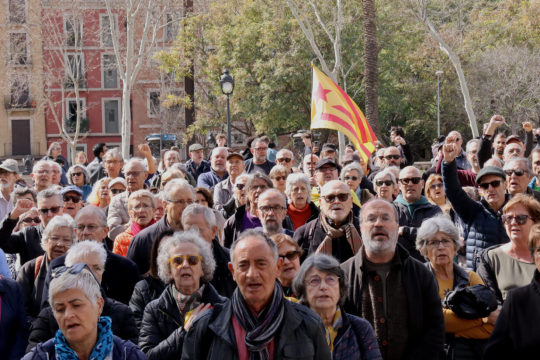
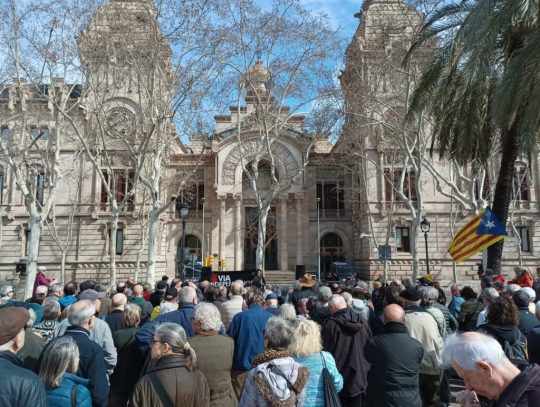
2nd February 2024. Photos from Vilaweb.
Demonstration in front of the High Court of Justice of Catalonia (the highest court of the Spanish judiciary system in Catalonia) in Barcelona in support of Dani Gallardo, a young Spanish anarchist who is sentenced to prison because the took part in a peaceful demonstration held in Madrid (Spain's capital city) in favour of Catalan people's right to self-determination and against the Spanish police's violence against Catalan people.
We have explained Dani's case before, you can read it in this post:
Dani has been sentenced guilty to send a message. Until his case, more than 4,200 Catalan people had been sentenced guilty for their involvement in the 2017 Catalan independence referendum or the protests that followed it. The Spanish judiciary system has proven that they won't stop at punishing Catalan people, they also sent the police to beat up the protestors who demonstrated for Catalonia in Madrid (Spain) and they're also jailing a Spanish man for his solidarity.
Dani was sentenced guilty of public disorder and attempt against authority with made-up claims that had been fabricated hours before he even got arrested. The Spanish police already planned to arrest people and blame them for this even before the event happened. Dani spent 13 months in pre-trial jail, then he was released for some time, and now has received the order to go to prison for 2 years and 11 months more.
Cases like this is why there is a demand for an amnesty. After the last elections to the Spanish government, the PSOE party needed the support of other parties to get enough votes to form government. One of the must-have demands of the Catalan political parties was an amnesty law (amnesty laws are not uncommon in Spain) that would cancel the punishments of people who have been found guilty of political crimes related to the independence movement since 2017, because none of these thousands of people committed real harmful crimes. This law is currently being negotiated, but the Spanish parties are trying to write it in a way that will leave as many people out of the amnesty as possible. At the same time, the Spanish judiciary system continues accusing new people of terrorism for attending peaceful political demonstrations.
For example, two democratically-elected pro-independence politicians (Puigdemont and Wagensberg) are being accused of terrorism for supposedly calling for people to protest in the Barcelona airport, a protest that was completely peaceful and which was called by a civil society organization and not by these politicians. But they're influential, so Spain looks for any way to punish them. How are the Spanish judiciaries claiming that Puigdemont and Wagensberg should be sentenced guilty of terrorism for an action where there was no terrorism? The Spanish judges' imagination has no limits when it comes to sentencing Catalans and Basques. They are saying that it's terrorism because some of the protestors had weapons. What weapons? Fire extinguishers, bottles, and the metal carts that people use to carry their luggage:

Because there were fire extinguishers and luggage carts in the airport and people brought their own water, a completely peaceful protest that happened there is terrorism. The worst part is that it doesn't outrage or surprise us anymore, because we're so used to this nonsense.
#actualitat#dani gallardo#catalunya#catalonia#spain#current events#right to protest#españa#european union#anarchist#political prisoners#political prisoner#madrid#barcelona#coses de la terra#catalan#independence#minority rights#social justice#civil rights
59 notes
·
View notes